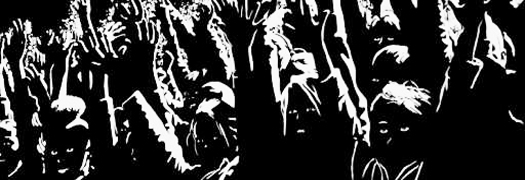
Features | Lists
By The Staff
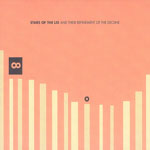
10 :: Stars of the Lid
And Their Refinement of the Decline
(Kranky)
This is the record I listened to most this year, and perhaps the one I have the least interest in dissecting.
I mean, what is there to dissect exactly?
So much of And Their Refinement of the Decline seems like the atom of a sound. Its effect, I think, lies in that imagined presence, or the way the whole thing just seems to lope in and out in faintly elliptic patterns, always moving but always on the cusp, also, of some lone standstill. It builds in increments and then re-invents itself periodically. It sprawls like any great double album, but really these tracks operate inside and without that concept, taking the sprawl and reach we’d expect and then exploding it into exact fragments and three second shards. Two notes (maybe three) playing out in slow recession and with minimal context. But because that sound is noise, and its context a kind of articulate silence, its effect—exact, exacting, and always emotional—is never miniature or small. It’s monolithic. And it never waivers. When it fleshes out, it’s only to add spectral keys and maybe a hint of horn: the slight apparition of sound.
It’s an honest representation, really, of what it is to just throw your head back and think: about sound, about pattern, about decay. And, for that, I suspect the need to over-rationalise or analyse or dissect this music is not only a misguided one: it is to miss the emotional open that Adam Wiltzie and Brian McBride have so meticulously and carefully crafted. And Their Refinement of the Decline is a record to be experienced, not intellectualized, and one will come out better for it.
Alan Baban
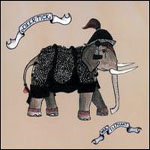
9 :: Deer Tick
War Elephant
(Feow!)
First off: if you still haven’t heard this year’s Fantasy Podcast (what, too good for indie-comp greatness? Yes, we know you’ve been busy, but…no hyperbole, it’s better than Christmas), or if you foolishly gave up before the 17:58 mark, I implore you. Deer Tick’s take on Sean Kingston’s “Beautiful Girls,” itself a JR Rotem (ugh) produced recycling of “Stand By Me,” is the finest cover of a remake you’ll hear in ’07. I mean, c’mon—that part after the solo when everything cuts out, save some light percussion and “ba-ba” backing vocals, and frontman John McCauley pleads in that heart-breaking rasp of his, “Please tell me why I’m feeling slighted / I don’t know how to make it better”? Hair-raising. But hey, don’t just take my word for it. It’s all right there on our podcast, sandwiched between my other favorite tracks. (Full disclosure: they’re all my favorites). Again, it really is better than whatever you’re doing right now. Give in.
I champion the Deer Tick cover in particular, beyond its ability to melt even Chet’s heart (another holiday miracle!), because it’s a microcosm of why I love this band so much, and why War Elephant is far and away my favorite debut of the year. (Er, well, label debut, anyway; they self-released Greatest Hits last year, featuring many songs recorded again here.) They’re able to create something thrilling from such a familiar framework by just playing it straight, letting their chemistry carry the tune instead of resorting to mindless imitation or gimmick. (Or JR Rotem [ugh].) The track is also a perfect lyrical fit for McCauley, whose own songs mine similarly depressive themes: loss, failed relationships, waning self-worth, regret, and an inescapable, defeating quest for salvation. As with “Beautiful Girls,” Deer Tick’s lyrics often center around a shit-cycle of contradiction that, seemingly beyond their control, leaves them ravaged and wallowing. Kingston’s love of the ladies has left him downright suicidal, while McCauley’s own desires have left him “broken and torn with halos at [his] feet,” falling apart “from the inside out.” Enervate good times, come on!
My point here being that Deer Tick, talented enough to make a now twice overplayed song sound fresh, approach their original material with just as much vigour. As recycled as War Elephant’s lyrical themes and musical archetypes may be, McCauley avoids amateurish mimicry by filtering the lot of it through a starkly unique voice—one which mines and bastardizes decades of songwriting tradition, from country to folk to indie-rock to grunge. On first listen it may seem like this results in an ambitious mess, the over-reaching of a young songwriter (he’s twenty-one; even younger when some of these songs were written) still finding his voice. But trust me, that doesn’t last. After months of using this album as an emotional crutch, wrapping myself in it exclusively for days at a time to help drudge through a supremely rotten year, I’ve come to love all fourteen of these songs, each for different reasons. Its best moments tower over anything remotely comparable this year, and though you’ll argue with me on this the first time you hear “Not So Dense” and “Christ Jesus,” there really isn’t a bum track to be found. Impessive for a twenty-one year old’s debut, no?
So, after you check out that Sean Kingston cover, I’ll implore you a second time: track down this record however you can, embrace it, be patient with it (it’s not a “grower” in the at-first-it-sucks sense, but lord does it grow), and try not to be overwhelmed. Its roots are familiar, but I guarantee you haven’t heard anything quite like War Elephant, this year or any other.
Scott Reid

8 :: Menomena
Friend & Foe
(Barsuk)
“It’s hard to take risks” sings Brent Knopf during “Wet and Rusting,” but you wouldn’t know it from the music supporting him. Bucolic keys float over kinetic and distorted dance drumming, coming from nowhere after a polite acoustic guitar shuffle. Isn’t that sort of dynamicism, coupled with the emotional vulnerability of the lyric, well, risky? A song before, his partner Justin Harris was heard wailing over guttural piano chords, recalling the frustrated poundings of little kids everywhere. Suddenly, he shouts, and a guitar vomits it back at him, and “The Pelican” shows its true colors: a tense break-up song accentuated by hiccupy drum and bass. Now, granted, that pensive-quiet to cathartic-loud shift is nothing new in twenty years of Pixies-informed rock music. But the chance Menomena takes can be found in the Jenga like way the band pulls notes and instruments out of the mix, and then piles new ones on. “Don’t you feel it / when I feel threatened?” Harris asks in the song’s second verse, and suddenly all but the guitar cuts out, grappling for the chord. For a split second, the mind’s eye sees a trapeze wire cut, a gymnast suspended in air, and something cold turns in your gut. But then the instruments return, swirling down into a lower chord change: the trapeze artist takes flight.
Then again, perhaps this kind of blueprint isn’t so audacious. Maybe the key is found in the video for “Wet and Rusting,” wherein the band constructs a perpetual motion machine out of three trampolines. It looks like fun, and it works, and it works because it was conceived and executed in a conspiratorial sense of having fun. There’s the secret ingredient: all of this invention and daring is merely the result of juvenile tomfoolery. So what to make of the profound melancholy under most of this work: even in the extremely silly video, the trampolines only come out of a bargain with the grim reaper, a plea for a few lost seconds to achieve a dream. Deadlines can be great for creativity, and there’s none more profound than death. Also, I wouldn’t characterize any song on Friend and Foe as happy, or even silly. Lines skew more towards sentiments like “What if all my enemies were dead?” “Write the suicide note into the movie,” and “I won’t let how I sincerely feel here stand in my way.” But I think it all adds up: their clear-eyed appreciation of the dualistic nature of life and love, how death fuels life’s greatest triumphs, and how friends and foes are sometimes the same people, make the band’s jokes so good, their music so emotionally fulfilling, their novelty feels inspired rather than calculated. Friend and Foe is the kind of album that reminds us why we write about music in the first place; and if a more satisfying one was released this year, I didn’t hear it.
Christopher Alexander
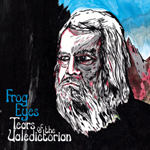
7 :: Frog Eyes
Tears of the Valedictorian
(Absolutely Kosher)
It’s difficult to think of a band considered so idiosyncratic and counter-marketable as Frog Eyes as being of cross-demographic worth, but if the great armchair enthusiasts’ game of rock n’ roll historicity has taught us anything it’s that albums that are of their time, as opposed to ahead of it, are much more likely to transcend the year-to-year dictums of trends and (ahem) year-end charts. We’re still venerating Dylan and Cobain for capturing the tenor of those years. 2007’s art may be thought of as portraiture half-enshrouded in thinning darkness, the subject of which—our homes, our selves, our families, our governments, our artists, you name it—when revealed were either monstrously ugly or luminous and beatific. Like a sepulchral preacher frothing from his pulpit of shuddering distortion, Cary Mercer describes a landscape of destitution and hysteria that is simultaneously unlike any other oratorical performance and very, very much of this flawed year of awakening that was 2007.
This is dense, tortured stuff. Frog Eyes begin with the suggestion of monoliths if only for those to be broken down. Each fractured, lumped pile of a song is a psychoanalyst’s playground of imagery; as the band move with grouped, intentional steps to disassemble, what’s often left is that quavering voice. Nowhere is this process better typified than the marathon scrawls, the great shaking masses of “Caravan Breakers, They Prey on the Weak and the Old” and “Bushels.” These songs are the released repressions of dirty cites, of derelict detail, and distorted reflections in grimy store windows. Each is as humorous and lamenting, as paradoxical and hypocritical as the refracted personalities of both the performer and the listener. If 2007 is the year of dawning horror via the process of self-discovery, then Frog Eyes show us the discovery, the “horror,” and the process all at once. Apt to its title, Tears of the Valedictorian is an appropriately complex while unapologetically emotive jeremiad on our pre-apocalypse.
Conrad Amenta

6 :: Pantha du Prince
This Bliss
(Dial)
This Bliss might seem like an odd choice for CMG’s Techno Album of the Year, considering the greater hype surrounding releases by Gui Boratto, Ricardo Villalobos, and of course, the Field. It’s especially hard not to compare it to the latter, since both From Here We Go Sublime and This Bliss reject minimal techno’s current fascination with glitchy micro-samples in favour of cleaner, brighter synths, and fuller production. But if the Field’s breath of fresh air is enough to forgive relatively straightforward programming, Pantha’s route is a lot murkier—a dense, gothic fog that’s still remarkably easy to listen to. Consider it the Silent Shout (2006) of 2007: intially foreboding and claustrophobic (at least to these ears), both records feel more and more hypnotic with repeated listens. Deftly interweaving sonic experimentation and ceaseless momentum, light and shadow, sweat and chill; Pantha’s delicate balancing act is endlessly exhilarating, even after an exhausting 74-minute run time. I’ve never seen him live, but I keep picturing Weber tweaking effects and loops with the grace and agility of a samurai — both a testament to the live feeling the record evokes, and the fact that he rarely plays a loop through once without shifting it slightly. Just listen to the endless permutations Pantha gets out of the three note ascending bell tones on “Walden 2,” clouding them in shimmering, warm reverb then suddenly stripping them to their bare, icy essence; or how those chimes suddenly intrude in the middle of a loop on “Urlichten” only to pull away again like some now-you-see-me-now-you-don’t shit. Now that’s sublime.
Joel Elliott

5 :: Battles
Mirrored
(Warp)
Here it is: Cokemachineglow’s #1 rap album of 2007.
Cough. I hope I’m not the only hip-hop fan dismayed by the, erm, complete lack of a certain significant cultural movement from this top ten, let alone the Glow’s list at large. And, to be certain, there’s nothing very hip-hop about Mirrored—it shares little of the ethos or emotional palette of the genre, and when samples emerge here they’re about layered maximalism, not the minimalism so often prominent in great hip-hop.
But—forget hip-hop for a minute—there is something very rap about this record. I’m talking about the difference between what Jay-Z and Wu-Tang and El-P created this year and what Andre and Lil’ Wayne and Raekwon did. I’m talking about those moments when a rapper transcends self and rips it porno hardcore, finding art in the shape of words placed in the blank spaces of a percussion track. Battles just trade words for guitar notes and then, to make things fun for those notes, send the percussion through a blackhole. This is why, despite being thrashy, mathy music made by drums + guitars + keyboard + microphone = band, when we most feel what Battles is accomplishing with their instruments our heads bob on the clean downbeat, appreciatively keeping time for the emcee—or, guitarist—or, vocals and keyboards. Or vocals run through keyboards. Or voicebox. Or demonchild.
Or whatever. There’s something braggadocious about being in Battles, about playing music this aggressively bizarre and instrumentally impossible. Thank god this funhouse Mirrored leaked so early: it wasn’t until I saw them open for (and surreptitiously outclass) Lightning Bolt in Cleveland months later that I got the importance of what this band was doing. Later in the summer Battles made believers out of my roommate, who only likes Duran Duran and Nas, and my girlfriend, who only likes Feist and Christmas music. I have a feeling this kinda happened for everyone. These are strange accomplishments for a band that glibly sends its listeners through fractured, ridiculous vistas. But I’m convinced it’s because beneath all their spring-coiled music theory pyrotechnics, these are dudes who like their shit 4/4 and fresh. These guys don’t want to take us on a prog odyssey; they just wanna floss.
Clayton Purdom
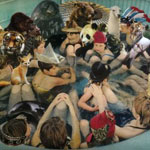
4 :: Panda Bear
Person Pitch
(Paw Tracks)
Traviss:
So, here’s what I’ve been thinking: everyone’s talking about how totally blithe this record is, but looking at the lyrics (posted on his Myspace, duh) I get a much more conflicted picture. He seems to be struggling with the problems that come from his being a successful musician, and though he obviously enjoys his job immensely, it’s clearly labor. Why else would he intone, in “Good Girl/Carrots,” “There’s a reason that I work / So hard at this stuff / When all I want to do / Is take it easy”? I’d argue that the music, a pretty euphoric concoction of all the coastal, minimal traditions in pop and dance, sometimes crammed together too giddily, mirrors his conflicted state at times, even pushing his psyche to unexpected violence (the pummeling drums at the beginning of “Good Girl/Carrots”) or outright temper tantrums (various interjections of shattering glass). That said, the lyrics for Person Pitch do stay resolutely plain, ranging from Buddhist-leaning axioms to patriarchal advice on ostensible indie culture. “Bros,” if I’m reading it correctly (“Hey man, what’s your problem?”) is a response to someone who’s clearly been giving Lennox some flack, though he is able to make up with him (I assume “him” since he’s his “bro”). Then, though the birth of his daughter has obviously brought a lot of joy into his life, it wasn’t exactly a game, as he told me when I interviewed him earlier this year:
“After [Young Prayer] I wanted to do something that was more casual sounding, easier to take, you know what I mean? So there was definitely a conscious effort on my part to go in that direction, but I also feel like I’ve been a much happier person in the past couple of years. Some things have become more difficult. Obviously having a kid isn’t a walk in the park. I feel like I’ve figured out ways of doing things that are much healthier for myself.”
All I’m saying is that perhaps Panda Bear isn’t the Frankie Valli reincarnation for which we’re all pining.
Dom:
Here’s what I’ve been thinking: I can’t understand most of the lyrics on Person Pitch, just as I can’t on most Animal Collective albums. That never seems a bother, though, because at least as far as AC is concerned, vocals play an ever-emerging role as some sort of gawky counter-rhythm, a flow parsed in extremes to temper the wildly clanging ephemera spinning around it. Panda’s second solo does the opposite, Lennox so determined to marry his voice with the exultant peaks around him that he’s simply got to hide any tar in his lyrics, any conflict in his themes. The conflation, then, is unbridled, every gear creaking to align towards something completely transcendent. And absolutely happy.
Traviss Cassidy

3 :: Supersilent
8
(Rune Grammofon)
I’ve been thinking a lot about Supersilent these days. Nothing too deep, mostly just the standard questions like, “What’s with all the numbers?” and “Why’d they give themselves that band name?” I’m probably not supposed to know the answers, but in my pondering I’ve at least come up with a few of my own conclusions. I think the numbers are just the best way for the group to get around having to lump words on top of their work; they’re trying to minimize non-musical elements in their musical theocracy. Okay, so experimental and minimal artists have been doing the same thing since before Arve Henriksen was a kid listening to Louis Armstrong and getting the wrong (but very right) idea. Then let’s consider the connotation I’m about to throw at the band name: “Supersilent” seems to me a comment on the band’s approach to music’s language, as if the group is saying (without really saying) that “the tighter our music’s lips the more you’re forced to gaze into the Norwegian-blue of our brooding electro-jazz eyes, the more our ‘supersilence’ is gonna telepathically slap you upside the head with the heaviest shit imaginable — then you will cry and you won’t even know why.”
There’s plenty of activity here, but it’s happening more on a horizontal level within the plane of its improvisation and less on a “let me communicate with you, listener!” slope. The thing is, Supersilent know how to make their communion transcendentally communicative in its own right, and I think a big part of the secret is that they make way for transmissions from the void; if the unusual instrumentation’s still essentially simple, the use of space at least is virtuosic. And that’s not some art gallery comment I just throw around: the last record I would have said the same about is Talk Talk’s Laughing Stock (1991), which is, no exaggeration, my favorite album of all time. You want an example, 8 overflows, but let me pick the one that still hits me like an anvil even after the hundredth listen. During the dying minutes of AOTY (Art of the Year) track “8.5,” when the synth washes are humming and after the trumpet is mostly done breaking your heart and in the middle of staccato drum rolls barely leaking in from some alternate universe of awesomeness, there’s a snatch of ride cymbal that’s gotta be the most “oh dear God” snatch of ride cymbal in existence. Because you think that cymbal’s going to continue, to dole out a stream of catharsis, to satisfy your appetite. But instead of whiting out the holes in their music, Supersilent just use the cymbal to accentuate them — fucker’s gone after two measly seconds. Instead of feeling like a dirty trick, though, it gives you a handful of star plasma to clutch as you continue tumbling through all the black in between points of light. Watch out for that “8.7” asteroid belt up ahead.
This is probably overstating the case, right? Except that we all wouldn’t be here, #3 of some Canadian website’s top albums of 2007, if we didn’t believe that music is important and it can speak to us in ways other mediums can’t. The very best books do something only literature can do, as do the very best films with cinema, or the very best videogames with videogamery, etc. After the relative failure of the 7 DVD (2006) Supersilent seem a group freshly aware of music’s inherent potential, beyond the grafts and intrusions and conventions of the other arts; 8 is 2007’s most direct document of that potential’s infinite depth. That we’re giving it the bronze is merely indicative of how damn hard it can be to look full on at something that threatens to swallow whole our perception, that confounds the compartments our minds use to cope, and that strikes rarely touched and so sometimes blissfully painful chords within something we don’t really have another name for but “soul.” This supersilence speaks unfathomable volumes.
Chet Betz
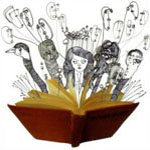
2 :: Future of the Left
Curses
(Too Pure)
I know a noise scene kid who, upon hearing Future of the Left’s debut Curses the first time, removed the disc from the stereo and threw it against the wall. It broke, and the friend for whom I had burnt it was all, “What the fuck, man,” because he hadn’t really gotten to listen to it yet and I had just finished telling him it was the album of the year. They then went back to smoking meth through their effects pedals, or whatever such people do.
The thing is, I get why noise kid hated this record. I see his sneer. I feel the calculated misogyny when he calls the record “pussy.” And I am, beneath the veneer of “filthy gutter-art connoisseur,” made joyous to the caramelly pop-loving core of my person by his disdain. I like the things other people don’t like so I can better understand the things other people do; I slugged through Ulysses for most of 2007 in hopes of figuring out how to make my writing more readable. Through me flows a tributary of the great noble river of pop music, and its mighty current makes me love things that everyone should—Pablo Picasso, “Don’t Stop’Til You Get Enough,” Wii Sports—and things that nobody ever should, such as the All-American Rejects.
But this isn’t about my lame, soft (soft) spots. Nor is this about noise kid’s supposed lack thereof. Or, rather, this is about both of us, but it’s also about a lot more. Curses is an unexpected colossus straddling that swift river of pop thought, feet planted firmly in a few different scenes and sounds and (yes) bands but casting a shadow over a much larger area and eroding from the same wind like all the other rubble in the countryside. So it is post-punk, Albini-bred, wantonly emotional in spots — it is also the sound of a band in ruthless control of itself, flaring sonic exclamation points onto “Real Men Hunt in Packs” and following some mid-album anthemic excess with a drums-and-insults retreat.
Curses is a sort of Barton Fink of twenty-first century music, a record swirling with ideas about pop and populism and the life of the mind but drowning in oil-black humor. Both are strange pieces of art in their respective eras, easily overlooked. Both movie and album end in flames and beauty, in that order, in different ways, meaning remarkably similar things and leaving the audience equally bruised and caressed. Talk about contradiction: This is the album of the year despite being Cokemachineglow’s number two album of the year because it is the only album of 2007 that follows the lineage set by Wolf Parade and Subtle in years previous. It checks the temperature of the soul and tells us that the fever is not subsiding, that the doctor is out but the symptoms indicate something new and not good.
What pissed off noise kid was that Curses has something Big to say, and it wants to be heard, but it tempers these ambitions with a mathematically arranged taste for sonic violence. It builds toward something he hates (a message) using elements of things he loves (noisy shit). This is pretty much my same beef with gingerbread houses, but unlike gingerbread houses this record is fucking important. It is the only Indie record of this year worth believing in. I can’t help but see Curses as a mirror of a cursedly ill generation: I can’t help but see my pop-loving heart popped out by those, a doppelganger that’s fun on the outside but with a heart of coal, all the bad thoughts and sounds compressed and (though smaller) made stronger. I can’t help but see a lot of people I know in Curses—even those who would rather break the disc than hear it.
Clayton Purdom
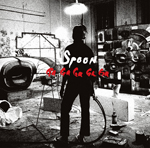
1 :: Spoon
Ga Ga Ga Ga Ga
(Merge)
On New Years Eve Spoon will play at the Metro here in Chicago. I’ll be there, though tickets are steep and the “WITH SPECIAL GUEST” addendums seem to amount to the Sea and Cake and, if we’re good, streamers, champagne, or the odd pall of top-heavy vocals and gingerbread bass that the venue hasn’t been able to shake in twenty years. That the Sea and Cake are local aficionados of a poppy distillation of Chicago’s experimental jazz scene—the avant-smooth jazz if you will, smelling of laundry detergent—is really only of regional importance to Spoon and to the night: why not Austin, from where the headliner hails, act the appreciative locus that throws the biggest bash of the year, the place where Britt Daniel gets to sing that song about “all acquaintance” as balloons cascade around him?
Because Spoon has no friends. Sure, Daniel lived in Chicago for a stint and has mentioned his affection for the city, has risen as a voice of restraint in indie-cum-mainstream martial law by scouring this land to discover the sharpest, catchiest riffs, but if he’s trying to reach out for something warmer, homier, his game face is unfortunately all business. Never any guest appearances, public validations of net-worth in any artistic community, or collaborative project that isn’t a charitable but vague mishmash comp or a soundtrack of recycled grooves; the closest Ga Ga Ga Ga Ga makes to assembling a posse is a winking mention of King Kong and dirty-successful pirating of another Texan band’s song (“Don’t You Evah” by the Natural History, but meh). As a beacon of community Spoon can only seem to gather the surly and the gorillas—the moths drawn to the flame of primal indulgence; shirtless braying broheims that talk through anything from Series of Sneaks (1998) and, as you are shorter, step around you to make it the exact width of your body closer to the stage. The magnetism of Spoon’s music is visceral, impregnated with possibility; their pull is universal.
Accordingly, most Spoon fans are assholes. I think these fans, the kind at least that make it to shows and pay expanding ticket prices at the behest of some tantalizing YouTube videos of the SNL appearance, are taking cues from the band, learning how to avoid misanthropy just enough to appear bare-bones cool. Of course, Spoon makes half-strides to award those followers attentive enough to know that they, the fans, are assholes: the band’s recent tour has featured sets where two songs from A Series of Sneaks moves into three from Girls Can Tell, then four from Kill the Moonlight and so on, mathematically charting the rise of their sonic unit into commercial viability. Half the venue will fidget through the first five songs or so, but the sentiment’s noble that Ga Ga Ga Ga Ga, their sixth full length LP, is only the end in a staunch flowchart of concision, in years of becoming all the more reticent to pop affectations for the cause of rock ‘n roll idealism. Yes, Spoon fans are assholes because every person can be a Spoon fan, and because most persons are assholes.
Which allows me to address the brown paperbag surprise at hand: Spoon holds Cokemachineglow’s top spot and no other record could stand in its way. No curmudgeonly heats, no nose-to-nose debate, for Spoon is far and away the consensus, an unapologetic bastion of populist indie for the post- demographic that we’ve struggled to squeeze out of for every waking moment of 2007. And here’s the kicker: we can all love Spoon not because it’s a common ground for extremes to discuss and hold hands over but because Ga Ga Ga Ga Ga has no friends, because it doesn’t need any friends, because Britt Daniel and Jim Eno and those two other guys have finally cored to the center of this cork planet. The record is imbibed with every functional trope of mainstream pop until it is so briskly self-sufficient that it can draw, camel-wise, from its own hump of tradition and creativity to touch types it shouldn’t, like mariachi glee and faux ragga and the bass steez of another band without the clout, knowing full well that other band’s name’ll be lost to an unforgiving tide, the tide being a subconsciously familiar phrase of gibberish more evocative of subconscious expectations in art and subliminal economics than anything else that stepped into Spoon’s arena this year.
So, Spoon is merciless and we’re rewarding them for it. I mean, I have no problem with it; New Years will be the sixth time I’ll see them live, one time for every album maybe. I’ve memorized every inch of this thing, even “Japanese Cigarette Case,” which—I’m sure you already know—is widely considered the album’s misstep. This album has no missteps. It is a balsa wood juggernaut, impossible to dislike and rigorously familiar, as if each spherical guitar tone promises a cubicular universe and a mild temperature. There are innumerable homes to be had in Ga Ga Ga Ga Ga, you see. Spoon knows that you’ll want the middle of your heart to move in on something this inviting, so modestly and delicately decorated. They’ve been practicing for years now. Just, finally, they can outright show you how they don’t need you anymore. They don’t need day jobs or producers. They don’t need media praise, number-one mentions or conflicted justification, detailed odysseys into the hypothetical musician’s soul. They don’t need food or oxygen. They are finally and totally independent.
And how fucking cool is that?





